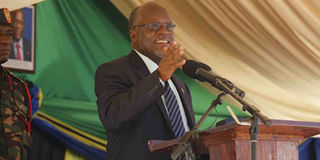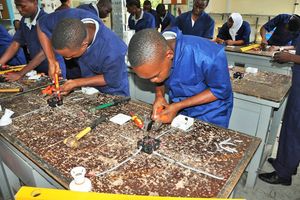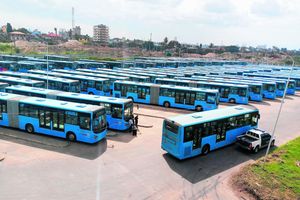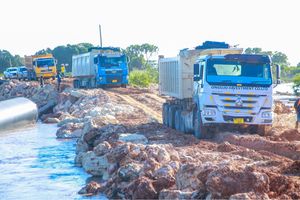JPM launches Upper Ruvu Water Treatment Plant

President John Magufuli
What you need to know:
- Speaking during the launch, Dr Magufuli said the project is part of the implementation of the 2015 Chama Cha Mapinduzi (CCM) election manifesto. He said the expansion aimed at increasing water supply by up to 95 percent in Dar es Salaam and Coast regions by 2020.
Ruvu. President John Magufuli has today launched the refurbished Upper Ruvu Water Treatment Plant (WTP) at Mlandizi, Kibaha District in the Coast Region. The project is worth Sh87 billion which is a soft loan from Exim Bank of India.
Speaking during the launch, Dr Magufuli said the project is part of the implementation of the 2015 Chama Cha Mapinduzi (CCM) election manifesto. He said the expansion aimed at increasing water supply by up to 95 percent in Dar es Salaam and Coast regions by 2020.
"I'm happy that the project has been completed… it’s a good move that deserves recognition, however the Ministry of Water and Irrigation should work on the key weaknesses that distorts the reputation of ministry," he said.
President Magufuli also directed all government institutions owed by water utilities across the country, to clear their areas or be disconnected from water services. He also insisted that water authorities across the country pay their power bills or risk being disconnected as well.
He was responding to a concern raised by the minister for Water and Irrigation Eng Gerson Lwenge who said the water utilities owes public institutions an outstanding bill amounting to Sh 40 billion.
However, the ministry also owes Tanzania Electricity Supply Company (Tanesco) an outstanding bill amounting to Sh8 billion.
Earlier, minister Lwenge said the project was among seven other strategic projects aimed at increasing water supply network.
Water from Upper Ruvu is pumped to reservoirs at Kibamba and Kimara through four main pipelines.
Beneficiaries of the plant are residents of Mlandizi, Visiga, Kongowe, Kiluvya, Kibamba, Mbezi and Kimara.
Others are from Changanyikeni, Ubungo, Kibangu, Makuburi, Tabata and Segerea.




